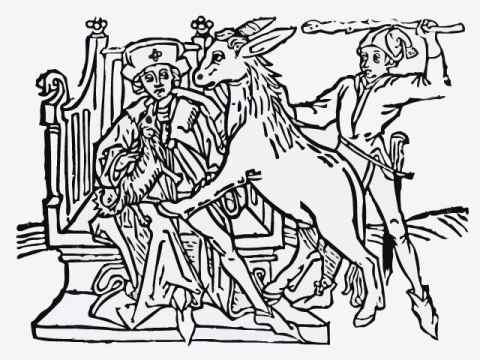ふくむすめどうわしゅう(Hukumusume fairy tale collection) > がいこくご(Foreign language)
>イソップどうわ(Aesop’s Fables)

ロバ と こイヌ
The Donkey and The Little Dog
(イソップどうわ)
(Aesop’s Fables)
ほんやく(Translation) ちいさな翻訳屋さん
| ♪にほんごのろうどく(Reading in Japanese)
|
♪えいごのろうどく(Reading in English) | ||||
|
|
にほんご(Japanese) ←→ にほんご(Japanese) & えいご(English) ←→ えいご(English)
こがた の イヌ と ロバ を かっている ひと が、いつも イヌ ばかり かわいがっていました。
A master, who had a little dog and a donkey, would always pet the dog.
よそ で ごちそう を たべる とき は、かならず イヌ に おいしい もの を おみやげ に もってかえります。
Whenever he ate out, he brought back some delicious treats to the dog.
そして イヌ が しっぽ を ふって よって いくと、なげてやる の でした。
When the master came home, and the dog came close to the master with its tail wagging, he gave the treats to the dog.
ロバ は、うらやましくて たまりません。
The donkey could not help but feel very jealous of the dog.
そこで じぶん も イヌ の まね を すれば かわいがって もらえる と おもい、
Thinking that the master would treat him in the same way as he did to the dog,
イヌ の まね を して しゅじん の そば に かけていき、ドタドタ と とびはねて みせました。
he decided to behave like the dog, so he expressed his joy by jumping and stomping when the master came home.
でも その ひょうし に、うっかり ごしゅじん を けとばして しまいました。
But the donkey kicked the master by mistake while jumping and stomping, which made the master furious.
しゅじん は かんかん に おこって ロバ を たたきだす と、こや に つなげて しまいました。
The master knocked the donkey out of the house, and yoked him to the barn.
この おはなし は、ひと には それぞれ じぶん に むいた しごと が あるから、
This story tells us that people have their own adequacy to different tasks by nature,
ひとまね を しても うまく いかない と いう こと を おしえています。
so behaving like others would not make things go well.
おしまい
The end
| 福娘のサイト |
| 366日への旅 毎日の記念日・誕生花 ・有名人の誕生日と性格判断 |
| 福娘童話集 世界と日本の童話と昔話 |
| 子どもの病気相談所 病気検索と対応方法、症状から検索するWEB問診 |
| 世界60秒巡り 国旗国歌や世界遺産など、世界の国々の豆知識 |



